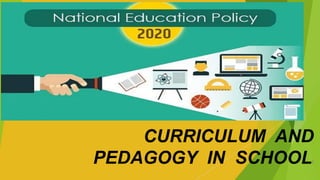
NCFSE-Rooted Curriculum
- 1. CURRICULUM AND PEDAGOGY IN SCHOOLl
- 3. Curricular Integration of Essential Subjects, Skills, and Capacities ❑ 4.23. students must have a large amount of flexibility in choosing their individual curricula ❑ certain subjects, skills, and capacities should be learned by all students ❑ In addition to proficiency in languages, these skills include: scientific temper and evidence-based thinking; creativity and innovativeness; sense of aesthetics and art; oral and written communication; health and nutrition; physical education, fitness, wellness, and sports; collaboration and teamwork; problem solving and logical reasoning; vocational exposure and skills; digital literacy, coding, and computational thinking; ethical and moral reasoning; knowledge and practice of human and Constitutional values; gender sensitivity; Fundamental Duties; citizenship skills and values; knowledge of India; environmental awareness including water and resource conservation, sanitation and hygiene; and current affairs and knowledge of critical issues facing local communities, States, the country, and the world.
- 4. ❑ 4.25. mathematics and mathematical thinking will be very important ❑ upcoming fields and professions that will involve artificial intelligence, machine learning, and data science, etc. Thus, mathematics and computational thinking will be given increased emphasis throughout the school years, starting with the foundational stage, through a variety of innovative methods, including the regular use of puzzles and games that make mathematical thinking more enjoyable and engaging. Activities involving coding will be introduced in Middle Stage. ❑ Every student will take a fun course, during Grades 6-8,like vocational crafts, such as carpentry, electric work, metal work, gardening, pottery making, etc ❑ All students will participate in a 10-day bagless period sometime during Grades 6-8 where they intern with local vocational experts such as carpenters, gardeners, potters, artists, etc. Vocational courses through online mode will also be made available. ❑ Children will be given periodic exposure to activities outside school through visits to places/monuments of historical, cultural and tourist importance, meeting local artists and craftsmen and visits higher educational institutions in their village/Tehsil/District/State.
- 5. ❑ 4.24. Concerted curricular and pedagogical initiatives, including the introduction of contemporary subjects such as Artificial Intelligence, Design Thinking, Holistic Health, Organic Living, Environmental Education, Global Citizenship Education (GCED), etc. at relevant stages will be undertaken to develop these various important skills in students at all levels. ❑ “Knowledge of India” in particular, Indian Knowledge Systems, including tribal knowledge and indigenous and traditional ways of learning, will be covered and included in mathematics, astronomy, philosophy, yoga, architecture, medicine, agriculture, engineering, linguistics, literature, sports, games, as well as in governance, polity, conservation. ❑ Specific courses in tribal ethno-medicinal practices, forest management, traditional (organic) crop cultivation, natural farming, etc. will also be made available. An engaging course on Indian Knowledge Systems will also be available to students in secondary school as an elective. Competitions may be held in schools for learning various topics and subjects through fun and indigenous games. Video documentaries on inspirational luminaries of India, ancient and modern, in science and beyond, will be shown at appropriate points throughout the school curriculum. Students will be encouraged to visit different States as part of cultural exchange programmes.
- 6. 4.28. Students will be taught at a young age the importance of “doing what's right”, basic ethical reasoning, traditional Indian values and all basic human and Constitutional values (such as seva, ahimsa, swachchhata, satya, nishkam karma, shanti, sacrifice, tolerance, diversity, pluralism, righteous conduct, gender sensitivity, respect for elders, respect for all people and their inherent capabilities regardless of background, respect for environment, helpfulness, courtesy, patience, forgiveness, empathy, compassion, patriotism, democratic outlook, integrity, responsibility, justice, liberty, equality, and fraternity) will be developed in all students. Opportunity to read and learn from the original stories of the Panchatantra, Jataka, Hitopadesh, and other fun fables and inspiring tales from the Indian tradition and learn about their influences on global literature. Excerpts from the Indian Constitution will also be considered essential. ❑ Basic training in health, including preventive health, mental health, good nutrition, personal and public hygiene, disaster response and first-aid will also be included in the curriculum, as well as scientific explanations of the detrimental and damaging effects of alcohol, tobacco, and other drugs.
- 7. ❑ 4.29. All curriculum and pedagogy, from the foundational stage onwards, will be redesigned to be strongly rooted in the Indian and local context and ethos in terms of culture, traditions, heritage, customs, language, philosophy, geography, ancient and contemporary knowledge, societal and scientific needs, indigenous and traditional ways of learning etc. – in order to ensure that education is maximally relatable, relevant, interesting, and effective for our students. ❑ Stories, arts, games, sports, examples, problems, etc. will be chosen as much as possible to be rooted in the Indian and local geographic context. Ideas, abstractions, and creativity will indeed best flourish when learning is thus rooted.
- 10. National Curriculum Framework for School Education (NCFSE) The formulation of a new and comprehensive National Curricular Framework for School Education, NCFSE 2020-21, will be undertaken by the NCERT - based on the principles of this National Education Policy 2020, frontline curriculum needs, and after discussions with all stakeholders including State Governments, Ministries, relevant Departments of the Central Government, and other expert bodies, and will be made available in all regional languages. The NCFSE document shall henceforth be revisited and updated once every 5- 10 years, taking into account frontline curriculum.